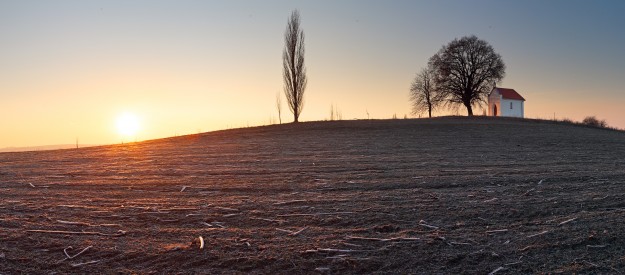"We are losing our attitude of wonder, of contemplation, of listening to creation and thus we no longer manage to interpret within it what Benedict XVI calls 'the rhythm of the love-story between God and man.'"
+ Pope Francis
Two tips for 2016

With 2015 having surpassed the expectations of many, 2016 should be another banner year on the climate and eco-protection front, right?
Well, not so fast. Yes, there is momentum, but if we forget two basics of our Catholic faith, we may have plenty of speed, but we’ll be going in the wrong direction.
First: Avoid Pelagianism (it’s still a heresy)
You know the story of Pelagius (354–c420), the British monk who taught that human will is enough to overcome our misfortunes. Pelagianism, as his heresy is known, supposes that you and I are really very good people and that we are untainted by the Fall. Pelagianism (and its various incarnations) seeks to convince us that by ourselves and our will alone we can do anything, be anything, and do what needs to be done to save our souls and the world around us.
At the root of this heresy is the teaching that God’s grace is something that we can do without.
That’s a crude account of a very serious problem that the Church has contended with for centuries—and still does. But you get the idea. In fact, you may have heard versions of this heresy in some Catholic eco-circles where we hear a great deal about our efforts and our programs and very little about the need for Christ's saving activity in any of this.
It is, of course, absolutely necessary for Catholic eco-advocates to urge and take right action, to labor in the world for needed prudential ends. But our activity will come to nothing—or worse—without the presence of the Triune God directing and elevating all that we discern and do.
In other words, our efforts must always be rooted in the grace of God—especially the sacramental grace that flows through the Church.
Second: Build unity (it aggravates our ancient enemy)
It is true that eco-activism has long been the purview of the political and social Left—even though conservation was once a core principal of conservative politics, although sadly this is often no longer the case. It comes with little surprise, then, that a disturbing trend in 2015 was an often hostile rejection of Laudato Si’ (and Catholic eco-engagement in general) by many on the Right and an unhelpful attempt to appropriate it by many long-time eco- and mostly Left-leaning eco-activists, who may have their own agendas.
Here’s the odd thing: when writing about ecology, Pope Francis and his predecessors have all been calling for unity. They’ve all said pretty much the same things in their eco-writings and their consistent message is that everything is related—you, me, human life, ecosystems, and the whole good order of God’s creation.
But here we are in 2016 where division abound—thanks, no doubt, through the temptations of our ancient enemy, who uses our own fear for change against us.
Given that everything is related, then all our ideologies need not be rejected. Rather they must be perfected (there’s that grace thing again). Once we seek this perfection, will can more readily work together—and indeed love one another—and so have a better shot to succeed at the planet- and people-saving work before us.
So let’s get out there in 2016—Left, meet and learn from the Right. Right, listen to the Left. And let's continue to build relations between the global North and South, East and West.
And if we need a perfectly good reason to work together and grow in unity, how’s this? Building unity within the Church pleases beyond words our Lord and Savior, Jesus Christ, who came, lived, died, and rose so that we may be one as He and the Father are one, now and for the ages and ages to come.


















